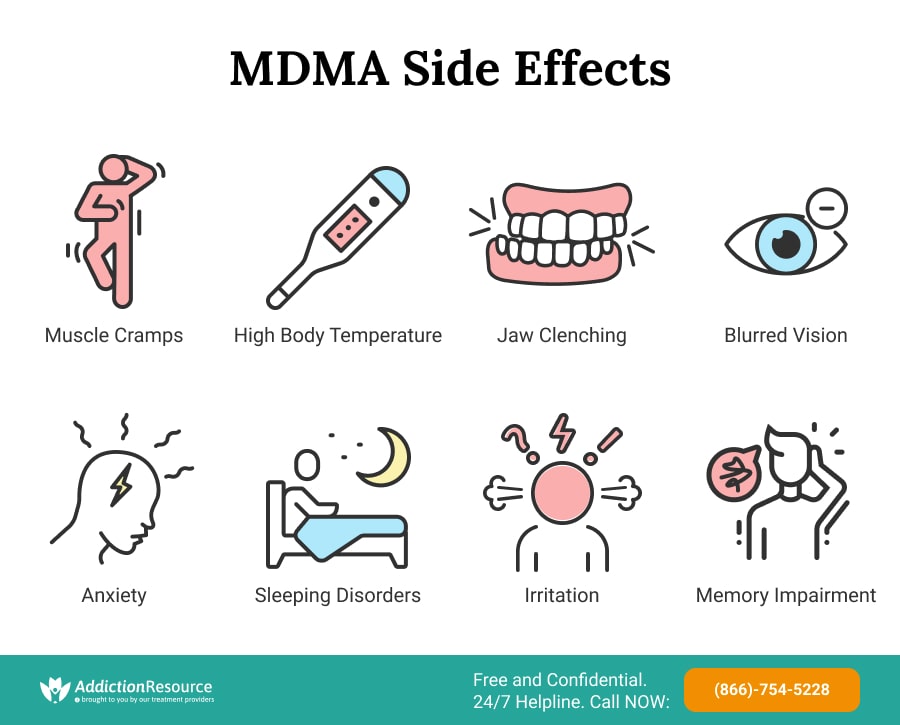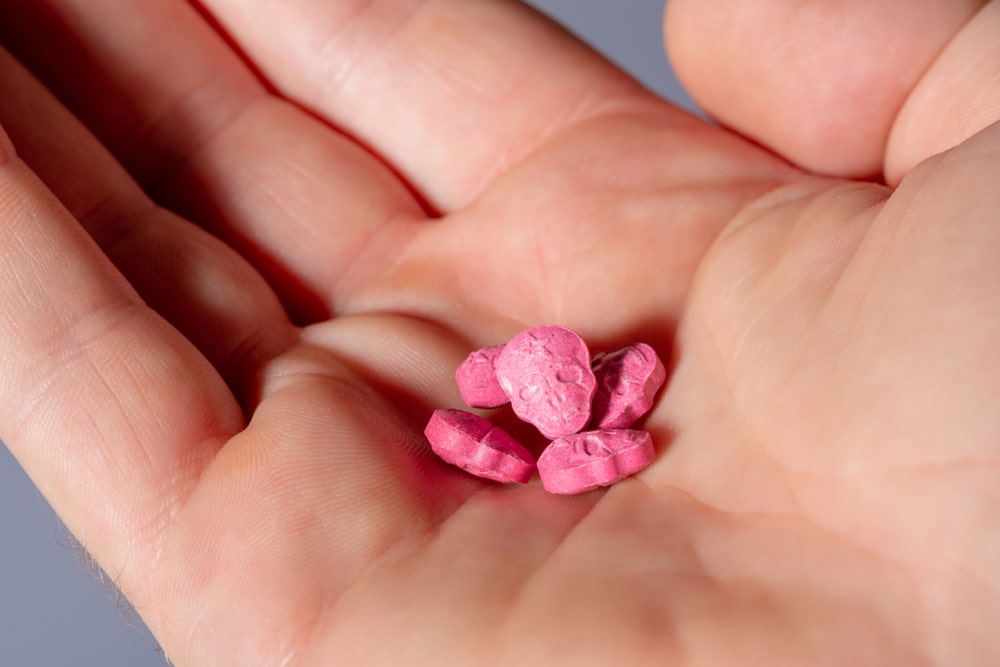MDMA is an illegal drug that has stimulant effects. Initially, the user gets feelings of intimacy and emotional warmth, sensitivity to touch, and a distortion of time and senses. It is considered a safe party drug, but its effects can turn out to be lethal. The longer you take the drug, the more likely mdma stays in the system and causes more side effects.
Table Of Contents:
Ecstasy is often taken in combination with other illegal drugs and pills sold as MDMA on the street that may hold additives. According to research, long-term cognitive problems tend to develop. Read more to explore some of the severe side effects of MDMA, its associated risks, and treatment options.
What Are MDMA Effects?
The effects of ecstasy may vary according to users. Ecstasy effects on a person vary based on many factors like their weight, size, health. Moreover, if the person is used to consuming it and other drugs are taken along with it, the side effects of MDMA can be more severe. Below are the long term and acute MDMA effects.
MDMA Long Term Effects
Regular users of ecstasy may find reduced appetite and changes in sleep patterns and neglect their overall health. They may result in “run down,” have declined energy levels, and be at a high risk of catching flu, colds, and infections.

There is some evidence that MDMA long term effects can include damage to some parts of the brain and that regular, heavy use can lead to depression.
Psychological symptoms can be:
- Users can suffer from sleeping disorders.
- Users can become irritable and restless.
- It is harder to control emotions, and one becomes more impulsive and aggressive.
- Reduced appetite and thirst may result in dehydration and weight loss.
- Reduced sexual arousal, physical contact may get less pleasurable overall.
- Reduction in mental abilities, particularly memory and the ability to focus
- Anxiety attacks
At the same time, one will feel the following physical MDMA effects:
- Muscle tensions and cramps
- Jaw clenching and teeth grinding usually occur due to psychological causes
- High body temperature results in the body getting chills and abnormal sweating.
- High blood pressure is dangerous to the heart.
- Feeling nauseous
- Vision might be blurry.
Several Months of Weekly Ecstasy Intake
After long-term ecstasy consumption, the previous MDMA side effects get stronger, and new ones can appear.
Psychological MDMA effects that become visible to others:
- Damage to brain cells causes pronounced memory impairment.
- Recurring confusion between reality and fiction
- Mood control is insufficient, and people lose their tempers, become aggressive, and behave impulsively.
- Anxiety and depression are present daily.
- Psychotic episodes are not uncommon.
The body is dangerously affected:
- Prolonged issues with sleep patterns become the barrier for the deteriorated body to redevelop.
- Kidney failure is a severe risk.
- Hemorrhage and a cardiovascular collapse
- Convulsions are triggered more easily.
- The body gets weak and overstimulated that death is a huge threat at its intake.
Acute MDMA Effects
Acute health side effects of MDMA may begin to show up within 30 minutes after oral admission of a single pill and may include tension, tachycardia, and raised blood pressures. Related acute effects include:
- High blood pressure
- Faintness
- Panic attacks
- In severe cases, a loss of consciousness and seizures.
- Accelerated heart rate and breathing
- A rise in body temperature (hyperthermia)
- Depersonalization
- Hot flashes or chills
- Sweating and dehydration
- Nausea
- Jaw clenching and teeth grinding
- Muscle or joint stiffness
- Tingling skin and muscle aches and pains
- Loss of inhibitions
- Excessive thirst
The most regularly perceived acute MDMA effects include:
- Reduced desire to execute physical and mental tasks (70%).
- Trismus (50%).
- Decreased appetite (65%).
MDMA Toxicity
An individual may encounter the intoxicating effects of ecstasy within almost 45 minutes after the intake of a single dose. However, MDMA can likewise cause several various intense health issues. While lethal overdoses on MDMA are uncommon, they can be life-threatening. In 2011, an estimated 22,498 emergency department visited included ecstasy use – with most of them happening among users between ages 18 to 29.
Permanent Effects After Stopping Molly
Once the user stops the intake of ecstasy, it will eventually make the brain gain its normal activity again. As a result, the brain will possess the required neurotransmitter molecules that help in the brain’s proper functioning. It all depends on the severity of the physical dependence and overall health, but people usually don’t experience MDMA side effects after six weeks.

Research done on monkeys indicates that serotonin is almost completely removed from the system after a high regular MDMA dosage for two weeks. Its level increases gradually but doesn’t achieve its original levels even after seven years.
On long-term molly usage, neurons get destroyed; as a result, the brain structure alters. The majority of the behavior and even actual wellbeing can get back to normal. However, a few harms done are irreversible.
Users may anticipate a generally everyday life in the wake of stopping ecstasy and dealing with physical and psychological well-being. Unfortunately, however, the odds are high that the memory will never go back again.
In a Nutshell, What Are the Risks?
Since the beginning, the risk of reliance on the drug is there because of the requirement of unfavorable withdrawal effects to be adjusted. At that point, the danger of mental addiction, by the craving to encounter more drug surges. This gives rise to MDMA side effects like:
- Brain chemistry may get imbalanced after certain days or weeks, and the behavior might get leveled out. Individuals may encounter impermanent memory, and emotional hindrances due to altered brain structure and other intellectual capacities essentially diminish.
- Users often face the risk of physical adverse effects. Individuals can rapidly weaken their kidneys, heart, or cause heat fatigue. Thus, even a first-time user tends to risk stressing these organs without focusing, which can be lethal.
- Pregnant women utilizing ecstasy influence their baby’s development. Babies exposed to MDMA anytime during pregnancy attain lower motor control and slower growth than normal ones. When four months old, they are less planned and have increasingly slow developments.
Does Ecstasy Overdose Happen?
Numerous individuals tend to prolong effects through the intake of high portions of the drug. However, if a lot of extra ecstasy is burned-through simultaneously, users report troubling symptoms of autonomic hyperarousal related to sensations of eagerness, suspicion, and uneasiness.

Resistance to ecstasy overgrows’ psychoactive properties, and the individual can’t reestablish the euphoric effects through repeated portions. With all things considered, sympathomimetic effects prevail, putting the patient in danger of cardiovascular instability, hyperthermia, and arrhythmias.
Signs Of An Ecstasy Overdose
High doses of the drug can influence the body’s capacity to direct temperature. This can prompt a spike in internal heat level that can occasionally bring about liver, kidney, heart failure, or even death. The drug’s utilization brings about releasing three chemicals in the brain: serotonin, norepinephrine, and dopamine. These are the brain’s neurotransmitters, and they impact sleep, mood, and appetite.
Essentially because this drug affects the serotonin levels when the drug wears off, the user may feel:
- Agitated
- Depressed
- Scared
Fits due to anxiety are likewise a typical indication of an overdose. Accordingly, each one of these indications can prompt suicidal thoughts and attempts.
Ecstasy Lethal Amount
As previously mentioned, an ecstasy overdose frequently occurs because of the mix of a wide range of drugs combined with exhaustion. The general dosage range of MDMA for recreational use ranges from 50 mg to 150 mg. Fatalities have been reported to have ingestions as low as 1.3mg/kg.
However, it is essential to keep in mind that everything relies on individual contrasts, the drug’s quality, and its utilization history.
Ecstasy & Death
Usually, MDMA-related fatalities are reported from rave parties. This drug’s stimulant impacts make the user dance for longer intervals, along with ordinarily present hot crowds that may prompt hyperthermia, dehydration, and heart or kidney failure.
In case the below-mentioned signs of an ecstasy overdose are witnessed, immediately call 911:
- Hyperthermia – High body temperature may harm numerous organs and even result in death. Heatstroke is usually deteriorated due to the club atmosphere, portrayed by multiple individuals suffer from the absence of fresh air.
- Heart attack – High degree of energy and an expansion in the heart and the blood rate can bring about a heart attack, particularly for individuals with underlying health issues.
- Hyponatremia – MDMA misuse may result in dehydration or hyponatremia, high water levels in the body, and death. MDMA results in the user feeling thirsty and lead to water retention (no sweating or urinating). As an outcome, the individual may keep drinking water that may bring about a lethal reduction in sodium levels in the blood.
Interactions with Other Drugs
The way that most ecstasy pills consist of unknown ingredients is risky because individuals taking the medication don’t know about the drug they are ingesting or how their body will respond.
Another risk is that likely interactions can happen between the ingredients just as some other substances individuals use with MDMA, for example, medications, alcohol, or other drugs. These dangerous substances can be primarily a threat when blended in with MDMA.
MDMA is regularly taken in mix with different substances, including:
- Marijuana
- Tobacco
- Cocaine
- EtOH
- Caffeine
- Amphetamines
This can increase the side effects of MDMA, such as heart rate, blood pressure, and anxiety. Taking ecstasy to help with the “comedown” symptoms can lead to a cycle of dependence on both drugs. Utilizing ecstasy and drinking alcohol simultaneously can prompt dehydration and overheat and build the comedown’s negative impacts.
Taking the drug can lead to some unpleasant MDMA effects such as increased heart rate, loss of coordination, nausea, and vomiting.
Treatment Of MDMA Effects
If the user feels any severe problem due to ecstasy usage, it’s crucial to get its specified treatment. This will help the individual learn how to stop using MDMA, avoid substituting it with other drugs, and improve mental health.
Treatment alternatives generally center around behavioral therapies that help individuals alter the fundamental patterns that add to substance use. Cognitive-behavior mdma therapy, individual guiding, and support groups are ways that may be used in one or the other outpatient or private settings.
Page Sources
- Klugman, A., & Gruzelier, J. (2003). Chronic cognitive impairment in users of 'ecstasy' and cannabis. World psychiatry: official journal of the World Psychiatric Association (WPA), 2(3), 184–190, https://www.ncbi.nlm.nih.gov/pmc/articles/PMC1525102/
- Kelly P. A. (2000). Does recreational ecstasy use cause long-term cognitive problems?. The Western journal of medicine, 173(2), 129–130, https://doi.org/10.1136/ewjm.173.2.129, https://www.ncbi.nlm.nih.gov/pmc/articles/PMC1071023/
- Better Health Channel, Esctasy (MDMA), 1999/2021, https://www.betterhealth.vic.gov.au/health/healthyliving/ecstasy
- Ferigolo M, Machado AG, Oliveira NB, Barros HM. Ecstasy intoxication: the toxicological basis for treatment. Rev Hosp Clin Fac Med Sao Paulo. 2003, DOI: 10.1590/s0041-87812003000600008, https://pubmed.ncbi.nlm.nih.gov/14762493/
- Wikibook Contributors, HUMAN PHYSIOLOGY, 2006-2007, http://bezak.umms.med.umich.edu/CIRHT/Content/Other%20Health%20Open%20Educational%20Resources/Physiology//Textbook-Human_Physiology-Wikibook-GNU%20FDL.pdf
- Hatzidimitriou G, McCann UD, Ricaurte GA. Altered serotonin innervation patterns in the forebrain of monkeys treated with (+/-)3,4-methylenedioxymethamphetamine seven years previously: factors influencing abnormal recovery. J Neurosci. 1999 Jun 15, https://pubmed.ncbi.nlm.nih.gov/10366642/
- NIDA, Can MDMA use during pregnancy harm the baby?, 2020, April 9, https://www.drugabuse.gov/publications/research-reports/mdma-ecstasy-abuse/can-mdma-use-during-pregnancy-harm-the-baby
- NIDA, MDMA (Ecstasy/Molly) DrugFacts, 2020, June 15, https://www.drugabuse.gov/publications/drugfacts/mdma-ecstasymolly
- NIDA, What are MDMA’s effects on the brain?, 2020, April 9, https://www.drugabuse.gov/publications/research-reports/mdma-ecstasy-abuse/what-are-mdmas-effects-on-brain
- Kalant H. The pharmacology and toxicology of "ecstasy" (MDMA) and related drugs, 2001, https://www.ncbi.nlm.nih.gov/pmc/articles/PMC81503/
- MOH Clinical practice guidelines, Management of Drug Overdose and Poisoning, May 2020, https://www.moh.gov.sg/docs/librariesprovider4/guidelines/cpg_management-of-drug-overdose-and-poisoning-may-2000.pdf
- Mohamed WM, Ben Hamida S, Cassel JC, de Vasconcelos AP, Jones BC. MDMA: interactions with other psychoactive drugs. Pharmacol Biochem Behav. 2011 Oct, https://pubmed.ncbi.nlm.nih.gov/21756931/


